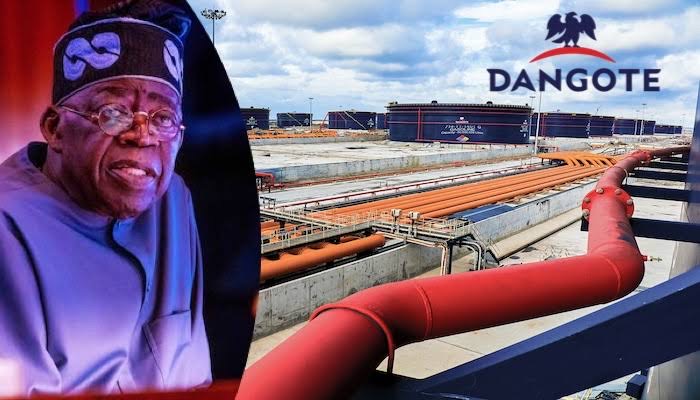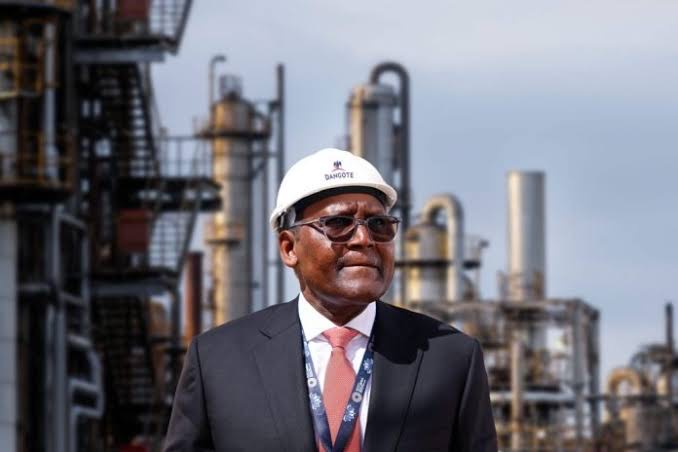The Federal Government of Nigeria and the Dangote Refinery have reached a significant agreement that will see the supply of 12 million barrels of crude oil to the refinery facility in the month of October. This supply arrangement is part of the broader “Crude Oil for Naira” deal, which represents a strategic partnership between the Nigerian government and the Dangote Group. The deal is designed to support local refining capacity, reduce fuel imports, and address the country’s energy security challenges.
Aliko Dangote, the chief executive officer of Dangote Refinery, confirmed this development during an interview in the United States. In the interview, Dangote elaborated on the specifics of the agreement, explaining how the partnership will enhance the ability of the refinery to process crude oil locally. This processing will result in the production of petrol, diesel, and jet fuel, primarily for the domestic market, but also with the potential to export surplus refined products.

“We are working towards a solid agreement with the federal government that ensures energy security for the country. This means no more fuel queues,” Dangote stated. “The government has committed to providing us with crude oil, and in October, they will deliver 12 million barrels, which translates to roughly 390,000 barrels a day. We will refine this crude to produce gasoline, diesel, and aviation fuel for the local market. Any surplus will be exported.”
This supply of crude oil, which equates to approximately 390,000 barrels per day, will be refined at the Dangote facility to produce critical fuels for the Nigerian market, including petrol, diesel, and jet fuel. Dangote emphasized that the successful execution of this agreement will not only help stabilize the local fuel supply but will also put an end to the frequent fuel shortages and long queues at petrol stations that have plagued the nation for years.
In addition to the immediate fuel security benefits, Dangote highlighted the broader economic impact of the agreement. According to him, the deal will enable the reopening of many non-operational petrol stations across the country, which have remained idle due to fuel shortages and supply issues.

“The deal with the government ensures that we sell the refined products to all marketers, which will mean the reopening of 50 percent to 60 percent of our petrol stations that have been idle,” he explained. This would substantially increase access to fuel for consumers across Nigeria, reducing the current pressure on the fuel distribution network.
The deal also carries significant cost-saving implications for the Nigerian economy. Dangote noted that one of the key benefits of local refining will be the reduction in the costs associated with the long-standing practice of importing refined fuel and the associated logistical challenges, such as ships idling off the coasts of Lome and other locations while awaiting clearance to dock.
This practice has led to substantial demurrage fees, which have further strained the country’s finances. Dangote estimated that the new arrangement could lead to savings of over $1 billion annually, simply by eliminating these unnecessary costs. “This will also reduce the costs tied to having ships floating off the coasts of Lome and elsewhere. In terms of demurrage alone, we are looking at saving over $1 billion,” Dangote added.
This agreement marks a pivotal moment for both the Dangote Refinery and Nigeria’s broader energy sector. The Dangote Refinery, which is the largest of its kind in Africa and one of the largest in the world, is expected to significantly reduce Nigeria’s reliance on imported fuel, a challenge that has long plagued the country’s economy.
Despite being one of the world’s largest oil producers, Nigeria has historically lacked sufficient refining capacity, forcing it to rely on imported fuel to meet domestic demand. This reliance has contributed to price volatility, fuel scarcity, and economic strain.
By refining crude oil locally, the Dangote Refinery will be able to meet a substantial portion of Nigeria’s fuel demand, providing much-needed stability to the domestic market. The government’s commitment to ensuring the supply of crude oil to the refinery further solidifies the partnership’s goal of boosting energy security and reducing the country’s dependence on imported petroleum products. The refinery’s output will not only serve the local market but will also create opportunities for Nigeria to export refined products, thereby generating additional revenue for the country.
Furthermore, the potential reopening of over half of the nation’s petrol stations could lead to a ripple effect throughout the economy. With improved access to fuel, transportation and logistics costs are likely to decrease, which could in turn lead to lower prices for goods and services across various sectors. The reopening of these stations will also create jobs and stimulate economic activity in the regions where these stations have remained dormant.
































